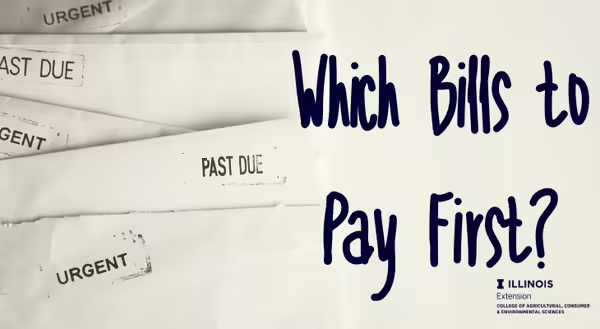
At different times in our life, seasons can get tough financially. If you find that you’re unable to make ends meet, you may have to make some tough decisions about which bills get paid before others. If you’re in this situation, here are some choices to consider.
Pay Basic Essentials
To weather a financial storm, you must pay your basic essential bills to live for your overall well-being. According to Maslow’s Hierarchy of Needs, you need to have these basic physiological needs met before any others are met. Your physiological needs (basic needs) include water, food, shelter, clothing, warmth, and a place to sleep. To reduce some stress, make sure you have a place to live and transportation to and from your employer, school or other obligations.
These essential bills should be the first ones you pay. For example, your mortgage or rent, utilities such as electricity and water, and transportation costs such as a car loan payment should be at the top of your list. The Consumer Financial Protection Bureau (CFPB) has an online tool to help you prioritize which bills need to pay. Pay the bills that keep you safe first!
Contact your Lenders
If you do have outstanding debt, this would be the time to contact your lender and see if you can make some arrangements. Arrangements may mean calling your lender and asking for a lower interest rate. It could also be asking if you can defer your payment for a few months until you’re back on your feet. If you don’t ask, the answer is no! What harm does it do to ask? This step could to prevent your loan or payment from ending up in collections, as well as save your credit from negative information.
Priorities of Debt
The National Consumer Law Center (NCLC) is a nonprofit organization with an expertise in consumer law. The NCLC has a publication, Surviving Debt, which provides valuable information on prioritizing debts. The section discusses high priority debts, soon to be high priority debt, as well as low priority debt. You may be surprised to know that credit card debt, medical debt and private student loans qualify as low priority debt. It doesn’t mean you get to ignore your bills, but that others such as child support, court judgements, car loans, rent/mortgage payments and utility bills are higher ranked because they need to be addressed first. These are higher priorities because they either keep you safe, are backed by collateral you risk losing or involve legal actions.
Choosing between which bills to pay before others can be extremely stressful. Prioritize so that your physiological basic needs are met first, including food, transportation and shelter. Contact your lenders if you’re in a crisis financially and see if they can delay payment, reduce your interest rate or both. Lastly, make sure you know which debts are low and high priority in terms of payment. Making these types of choices aren’t easy, but creating a plan can help to ease that burden.
Other applicable Plan Well, Retire Well blog posts: